How to Notify MQTT Messages to SNS Using AWS IoT Rules
In this article, we will explain how to use AWS IoT Rules to notify the content of MQTT messages to Amazon SNS.
The SNS (sns) action sends the data from an MQTT message as an Amazon Simple Notification Service (Amazon SNS) push notification.
SNS
This time, we will automatically construct AWS IoT Rules, SNS topics, and IAM roles using CloudFormation to create a system that sends SMS notifications when temperature data exceeds a certain threshold. This allows you to receive important information promptly and respond accordingly.
We referred to the following page:
Configuration

- AWS IoT Rule: Notifies SNS of messages published to a specific topic.
- IAM Role: Grants permissions for the IoT Rule to access SNS.
- SNS Topic: Uses SMS and specifies a mobile phone number as the notification destination.
Resources
AWS IoT Rule Settings

We define the rule using SQL. This time, we will create a message consisting of three data points. In addition, use the FROM and WHERE clause to set the topics and conditions under which the data will be retrieved.
device_id
This data is named device_id and uses the topic function to split the topic name by slashes and retrieve the second string.
Returns the topic to which the message that triggered the rule was sent. If no parameter is specified, the entire topic is returned.
topic(Decimal)
reported_temperature
Named reported_temperature, it uses the temperature data included in the message delivered to the original topic.
max_temperature
Named max_temperature, this value is a fixed value of “30”.
FROM clause
In the FROM clause, specify the topic name from which to retrieve the data. In this configuration, we target the topic device/+/data.
WHERE clause
Using the WHERE clause, we set a condition on the data to be processed. Specifically, we target only messages where the value of temperature is greater than 30 to notify SNS.

As an action for SNS, specify the notification destination SNS topic, format, and IAM role. Set the format to RAW.
For the basics of AWS IoT Rules, please check the following page:
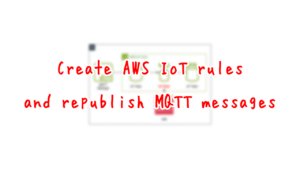
IAM Role Settings
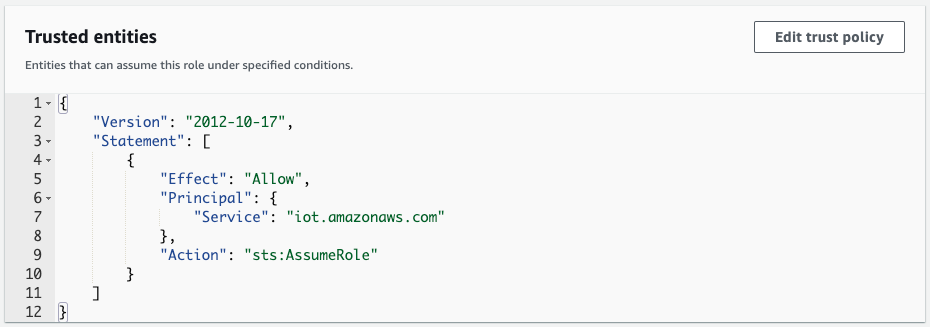
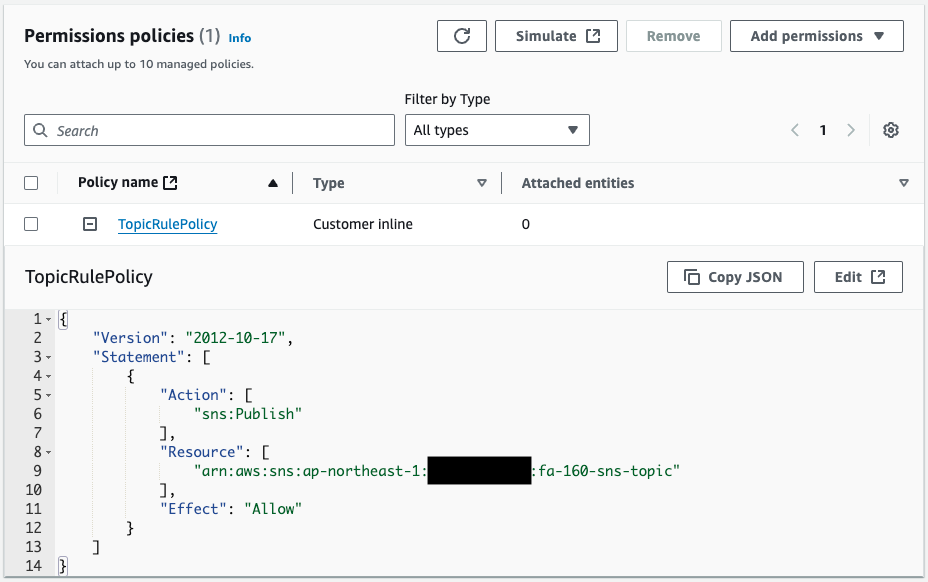
In the trust policy, allow the iot.amazonaws.com service to assume this IAM role. The IAM policy attached to the IAM role permits the sns:Publish action. Specify the ARN of the SNS topic as the target, allowing messages to be sent to this topic.
We referred to the following page for the necessary permissions:
SNS Topic Settings

Subscribe to this topic by specifying the mobile phone number and SMS protocol.
For how to notify messages via SMS, please check the following page. Note that by default, the AWS account is placed in the SMS sandbox, so messages cannot be notified to unregistered phone numbers.
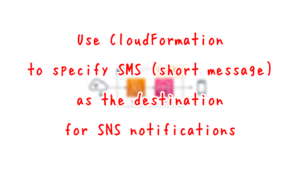
CloudFormation Template
AWS IoT Rule
Resources:
TopicRule:
Type: AWS::IoT::TopicRule
Properties:
RuleName: temp_limit_notify
TopicRulePayload:
Actions:
- Sns:
MessageFormat: RAW
RoleArn: !GetAtt TopicRuleRole.Arn
TargetArn: !Ref SnsTopicArn
AwsIotSqlVersion: 2016-03-23
RuleDisabled: false
Sql: !Sub |
SELECT topic(2) as device_id,
temperature as reported_temperature,
30 as max_temperature
FROM '${TopicName}'
WHERE temperature > 30
Code language: YAML (yaml)IAM Role
Resources:
TopicRuleRole:
Type: AWS::IAM::Role
DeletionPolicy: Delete
Properties:
AssumeRolePolicyDocument:
Version: 2012-10-17
Statement:
- Effect: Allow
Action: sts:AssumeRole
Principal:
Service:
- iot.amazonaws.com
Policies:
- PolicyName: TopicRulePolicy
PolicyDocument:
Version: 2012-10-17
Statement:
- Effect: Allow
Action:
- sns:Publish
Resource:
- !Ref SnsTopicArn
Code language: YAML (yaml)SNS Topic
Resources:
Topic:
Type: AWS::SNS::Topic
Properties:
FifoTopic: false
Subscription:
- Endpoint: !Ref PhoneNumber
Protocol: sms
TopicName: !Sub "${Prefix}-sns-topic"
Code language: YAML (yaml)Full Template
Verification
If the temperature is above 30
First, subscribe to the topic device/+/data.

Next, publish a message to the topic device/32/data.

You have successfully received the message on the subscribed topic. This topic uses wildcard notation and can receive the message you just published.
Looking at the value of temperature, it is “38”, which is greater than 30. Therefore, this message meets the condition of the AWS IoT Rule, and a message is sent to the SNS topic.

Check the SMS app on your mobile phone. Indeed, the message has been sent. Looking at the content of the message, it includes three data points: device_id, reported_temperature, and max_temperature. Each corresponds to what was specified in the SQL expression.
If the temperature is less than 30
Finally, send one more message. Publish a message to the topic device/33/data.

The message was successfully published. However, no short message arrived on the mobile phone. This is because the temperature value of the published message was “28”, which is less than 30. In other words, this message did not meet the condition of the AWS IoT Rule, so a message was not sent to the SNS topic.
Conclusion
We have confirmed how to use AWS IoT Rules to notify MQTT messages to Amazon SNS. By utilizing CloudFormation, we automated the settings of the SNS topic, IAM role, and IoT Rule. This mechanism allows you to receive important information in real-time and enables prompt response.
Notifying SNS using AWS IoT rules
On this page, you will see how to use AWS IoT rules to notify SNS of the contents of MQTT messages.
The SNS (sns) action sends the data from an MQTT message as an Amazon Simple Notification Service (Amazon SNS) push notification.
SNS
In this case, we will use CloudFormation to automatically build AWS IoT rules, SNS topics, and IAM roles to create a system that will notify you via SMS when temperature data exceeds certain thresholds. This will allow us to receive and respond to critical information quickly.
The following pages are used as reference for this issue.
Environment

- AWS IoT Rules: Notify SNS of messages issued to specific topics.
- IAM Roles: Grant permissions for IoT rules to access SNS.
- SNS Topic: Use SMS and specify a cell phone number as the notification destination.
CloudFormation template files
The above configuration is built with CloudFormation.
The CloudFormation template is placed at the following URL
Explanation of key points of template files
AWS IoT Rules
Resources:
TopicRule:
Type: AWS::IoT::TopicRule
Properties:
RuleName: temp_limit_notify
TopicRulePayload:
Actions:
- Sns:
MessageFormat: RAW
RoleArn: !GetAtt TopicRuleRole.Arn
TargetArn: !Ref SnsTopicArn
AwsIotSqlVersion: 2016-03-23
RuleDisabled: false
Sql: !Sub |
SELECT topic(2) as device_id,
temperature as reported_temperature,
30 as max_temperature
FROM '${TopicName}'
WHERE temperature > 30
Code language: YAML (yaml)For basic information on AWS IoT rules, please refer to the following pages.

To send a message to an SNS, set the Sns property.
The MessageFormat property allows you to set the format of the message to be sent.
You can select either “JSON” or “RAW” for this property, and the latter is specified in this case.
The TargetArn property specifies the SNS topic to be notified.
The Sql property defines the specific rule.
In this case, we will create a message consisting of three pieces of data.
The first is data named device_id.
This data uses the second string from the following topic function, which splits the topic name with a slash.
Returns the topic to which the message that triggered the rule was sent. If no parameter is specified, the entire topic is returned.
topic(Decimal)
The second is data named reported_temperature.
This uses the temperature data contained in the message delivered to the original topic.
The third data is named max_temperature.
This value is fixed at “30”.
The FROM clause specifies the name of the topic from which to retrieve data.
In this configuration, the topic device/+/data is targeted.
The topic name is specified using CloudFormation’s built-in function Sub.
However, the WHERE clause is used to set conditions on the data to be processed.
Specifically, the SNS will be notified only when the value of temperature is greater than 30.
Below are the IAM roles for AWS IoT rules.
Resources:
TopicRuleRole:
Type: AWS::IAM::Role
DeletionPolicy: Delete
Properties:
AssumeRolePolicyDocument:
Version: 2012-10-17
Statement:
- Effect: Allow
Action: sts:AssumeRole
Principal:
Service:
- iot.amazonaws.com
Policies:
- PolicyName: TopicRulePolicy
PolicyDocument:
Version: 2012-10-17
Statement:
- Effect: Allow
Action:
- sns:Publish
Resource:
- !Ref SnsTopicArn
Code language: YAML (yaml)In the inline policy for the IAM role, give the SNS the necessary permissions for notification.
The required permissions are listed on the following page.
Specify this IAM role in the RoleArn property described above.
(Reference) SNS Topics
Resources:
Topic:
Type: AWS::SNS::Topic
Properties:
FifoTopic: false
Subscription:
- Endpoint: !Ref PhoneNumber
Protocol: sms
TopicName: !Sub "${Prefix}-sns-topic"
Code language: YAML (yaml)Set SMS as the protocol and the cell phone number as the notification destination.
For information on how to notify messages to SMS, please see the following page.

In particular, by default, messages cannot be notified to unregistered phone numbers because the AWS account is placed in the SMS sandbox.
Please read the page above to learn more about this.
Architecting
Use CloudFormation to build this environment and check its actual behavior.
Create CloudFormation stacks and check the resources in the stacks
Create CloudFormation stacks.
For information on how to create stacks and check each stack, please refer to the following pages.
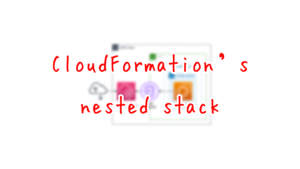
Check the AWS IoT rules created.

You can see that the SQL expression that is the body of the rule has been successfully set.
We can also see that the rule targets messages issued to the topic device/+/data.
You can also see that notifications to SNS are specified as an action.
Check the details of the notification action.

You can check the SNS topics, etc. to which you are notified.

The SNS topic has been successfully created.
When I check the device subscribing to this topic, it does indeed specify “SMS” as the protocol and a phone number as the endpoint.
Operation Check
Now that you are ready, access the MQTT test client page to check the operation.
First, subscribe to the topic device/+/data.

Then issue a message for the topic device/32/data.

The topic device/+/data allows us to receive the previous message.
This topic can receive the previous message by wildcard notation.
Looking at the temperature value, it is “38”, which is greater than 30.
This means that this message meets the requirements of the AWS IoT rule, so the message will be sent to the SNS topic.
Check the SMS application on your phone.

The message was indeed sent.
Looking at the content of the message, it contains three pieces of data: device_id, reported_temperature, and max_temperature.
Each is as specified in the SQL expression.
Send the message one last time.
Issue a message for the topic device/33/data.

The message was successfully issued.
However, no short message was received on the cell phone.
This is because the temperature value of the issued message was “28”, which is less than 30.
This means that the message was not sent to the SNS topic because it did not meet the requirements of the AWS IoT rule.
Summary
AWS IoT rules can be used to notify SNS of messages.
Appropriate use of the WHERE clause can be used to limit the target messages.